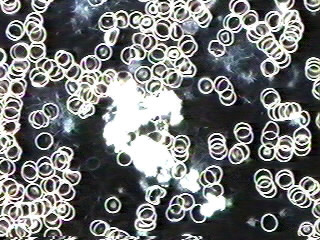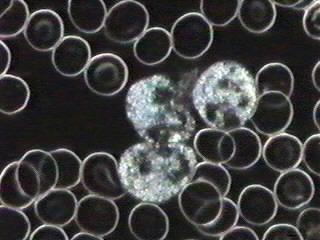

![]()
![]()
Oxygenation
For many years, I thought that the vocabulary of natural medicine and conventional (allopathic) medicine were worlds apart. However, with the discovery of darkfield microscopy (my own exposure to this fascinating tool), I have come to appreciate what the term "cleansing" means as well as what "toxicity" looks like.
Darkfield microscopyis very popular in Europe and considerably less well known in the U.S. where it is sometimes confused with other types of microscopy. In darkfield, one sees details that are invisible in electron microscopy, particularly details in the plasma. Additionally, one observes live blood and can therefore develop a sense of "context" for roles played by different types of white blood cells. The capacity to view living blood is enabled because no fixative is used. Nearly every naturopath and many medical doctors in Europe use darkfield routinely. Increasingly, this method of observation is being used in Canada also. Patients are often provided a copy of the video footage of their blood. The pictures on this page are from a patient in Canada.
 |
The image on the left has been captured from video footage of a darkfield blood examination. In the image, one sees fibrin, the cobweb-like material near the upper right, upper left, and middle left, usually interpreted as indication of liver stress. One also sees undigested food, crystals, bacteria, a few parasites, and some weakened red blood cells. In this particular frame, no healthy white blood cells are visible. |
I do not claim to be an expert in darkfield microscopy, but I am enthralled by the technique. What one sees in the mobile situation are the usual red blood cells, white blood cells, plasma—and what is floating in the plasma. Microbial activity, parasites, fungi, toxins, crystals, and undigested food are all visible as is the capacity of the red blood cells to circulate and the white blood cells to destroy morbid matter.
Oxygenation
As we know, red blood cells transport oxygen to the tissues of the body. Without oxygen, we are devitalized, and according to some theories, the tissues go into a morbid state in which they survive on fermentation rather than oxygenation. This is what is referred to as anaerobic;and it is believed, by such persons as Nobel laureate Prof. Otto Warburg, that cancer thrives in such oxygen deficient conditions.
With darkfield microscopy, one often sees sees a condition called "rouleau" in which the red blood cells are stacked together. Some people believe it is because of the stress on the body of poor metabolism and others believe it is due to this as well as pH (acid-alkaline balance) or wrong dietary choices or even simple dehydration. In any event, it is usually correctable. Another condition that is observed is one in which the activity of red blood cells is compromised because of infection, bacterial or viral, or parasitization. In some cases, the red blood cells are misshapen due to lack of nutrients.
 |
In this frame, we see a condition called "rouleau" in which the red blood cells are clumped together and stacked like coins. Rouleau affects proper oxygenation because the red blood cells do not circulate well enough to deliver oxygen where it is needed. The condition also favors the growth of unhealthy organisms that can survive in a milieu that is less oxygen rich. Fungi, bacteria, and viruses require less oxygen than healthy tissue. |
Commentary
Many years ago, I did an astrological study of oxygenation in which I tried to determine the many reasons for poor lack of oxygen in the tissues. One could start with very simple premises such as lack of air: people live in devitalized cities or they spend too much time indoors where the air is recirculated or they do not breathe deeply enough. Secondly, they could be anemic. The red blood cells may lack sufficient hemoglobin or they could be deficient in number. We could go on and on, but I never factored in such possibilities as rouleau or aggregating of erythrocytes or hemolysis due to toxicity. I also never thought of blood parasites devouring red blood cells or mold dematerializing them.
When I was in a clinic in Germany, I had the opportunity to see how very different the causes of poor oxygenation were from patient to patient. It was fascinating to me, also interesting was the fact that so many years elapsed between my first interest in this important issue and my darkfield adventure.
Identifying Causal Factors
It has always been clear to me that the more we know about what is really wrong, the better our ability to make sound medical choices. It will help tremendously if I put this in a context patients can readily understand and appreciate.
Let us assume that a highly motivated patient has heard of Warburg's work and wants to correct oxygen levels in his or her blood. A very basic preliminary test would be to use an oximeter to measure the oxygen level. You can buy a device like this online, but it will not tell you why the oxygen level is low. It will merely display a number. For the moment, we will assume the number is less than optimal and the patient wants to correct the problem.
In most instances, the patient would be given iron supplements. They may or may not address the problem. This would depend on whether the body was able to utilize the iron as well as whether or not there is a more complex explanation for the deficiency. Many patients end up taking food grade hydrogen peroxide to increase oxygenation of their blood; others engage in yogic breathing exercises. Some go to clinics that offer hyperbaric oxygen treatments or oxygen infusions involving the removal of blood and infusion of oxygen or ozone into the blood and then a gradual transfusion back into the body through a very tiny needle. All of these measures are "reasonable" but will any of them actually work if red blood cells lack hemoglobin or there is mold in the blood causing instant death of the blood or parasites that are gulping a quarter of a cup a day of blood?
Now, I think you understand perfectly why having the ability to zero in on the real cause of the weak oxygenation was so exciting. In some cases, the explanation was very simple: the body is not getting the nutrition it needs to build healthy red blood cells. In other cases, the red blood cells were so infected that they not only adhered to each other, but they were deformed. In any event, it is very clear now why taking a generic blood purification or blood boosting formula may or may not address a problem adequately.
By this, I mean to say that while our Seneca Elixir, the one used by the Canadian patient in the example on this page, helped her tremendously, there is no reason to believe that it is the right formula for someone else. It probably would not hurt anyone, but if time and effort is wasted by focusing on a possibility or probability that is irrelevant, then one did lose some time and perhaps also momentum.
Strategies
Now that I have made a case for why one size does not fit all, I would also like to urge patients to find what works in the life-threatening situations in which people sometimes find themselves. One rule I have is that if you are not getting better, there is a good possibility, the treatment is not working. It doesn't matter that it worked for someone else or that it was recommended by someone reputable, improvement is the main standard by which success and failure should be measured.
I know it is frustrating. I can present ideas and possibilities that are not readily available. How do you someone who can guide you through the processes that are important to you? The answer is you keep looking, but you take responsibility for assessing your responses and for determining the value of the strategies in your situation. You can also discuss this with your primary health care provider and agree on a time table for evaluating responses in an objective and meaningful manner.
This said, there are some general strategies that work for many people. For instance, nearly everyone benefits from nutritious food. Your doctor will probably not even discuss this with you so finding an expert in nutrition to counsel you about your particular needs is a really good idea. The "terrain" as it is called in schools of biological medicine determines the ability of unhealthy organisms to survive. You are more responsible for your terrain than your doctor because you choose your food and beverages. This gives you control over much more than you realize. For instance, while your doctor may not even have taken a single course in nutrition, you will find hundreds of books on diet, nutrition, fasting, food preparation and combining, alkalizing your diet, etc., etc., etc.
In my opinion, it behooves each patient to find out as much as possible about the underlying conditions, to assess the terrain, and where possible to make healthy adjustments. No one can guarantee that addressing the terrain will cure cancer, but neither can someone who fixes a flat tire guarantee that you will never have another flat. In life, we drive over nails and expose ourselves to hazards that undermine our health. If we avoid the hazards and correct what we can, we can expect a better quality of life and perhaps freedom from disease? It's an assumption, not a promise.
 |
The
same person's blood after one month on the Compound Syrup Scrophularia
of Eli Jones.
Notice the abundant presence of healthy white blood cells, the absence of rouleau, lack of fibrin, clean plasma, and vital appearance of the red blood cells.
|
.
For information related to white blood cell activity and immunity, click here
Lymphatic Cleansing and Stimulation
Checklist
Index ![]() Cleaning
the Mental Slate, the Value of Second Opinions
Cleaning
the Mental Slate, the Value of Second Opinions
Anti-cancer
Herbs ![]() Blood
Cleansing
Blood
Cleansing ![]() Itching
Itching ![]() Liver
Liver ![]() Mold
Mold
The Lymphatic System ![]() Lymphatic
Cleansing and Stimulation
Lymphatic
Cleansing and Stimulation
Blood Oxygenation ![]() Red
Blood Cells
Red
Blood Cells ![]() White
Blood Cells/Immunity
White
Blood Cells/Immunity
Digestion ![]() Lower
Intestine
Lower
Intestine ![]() Intestinal
Flora
Intestinal
Flora ![]() Parasites
Parasites ![]() Regeneration
Regeneration
Recovery ![]() Emotions
Emotions ![]() Karma
Karma ![]() Ho'oponopono
Ho'oponopono ![]() Spiritual
Insights
Spiritual
Insights
![]()
Much of the material on this site is historic or ethnobotanical in origin. The information presented is not intended to replace the services of a qualified health care professional. All products discussed on this site are best used under the guidance of an experienced practitioner.
We encourage patients and their friends and family to avail themselves of the information found on the Internet and to share their discoveries with their primary care practitioners. If there are questions about the suitability of a product or strategy, please have your practitioner contact the web hostess.
We are interested in feedback, clinical data, suggestions, and proposals for research and product development. While we naturally hope for the happiest outcome in all situations, the authors of this web site, webmaster, server, publishers, and Sacred Medicine Sanctuary are not responsible for the success, failure, side effects, or outcome of the use of any of the information or healing strategies described on this site.
Sacred Medicine Sanctuary
Copyright by Ingrid Naiman 2000, 2001, 2005
*The information provided at this site is for informational purposes only. These statements and products have not been evaluated by the Food and Drug Administration. The information on this page and these products are not intended to diagnose, treat, cure, or prevent any disease. They are not intended to replace professional medical care. You should always consult a health professional about specific health problems.
